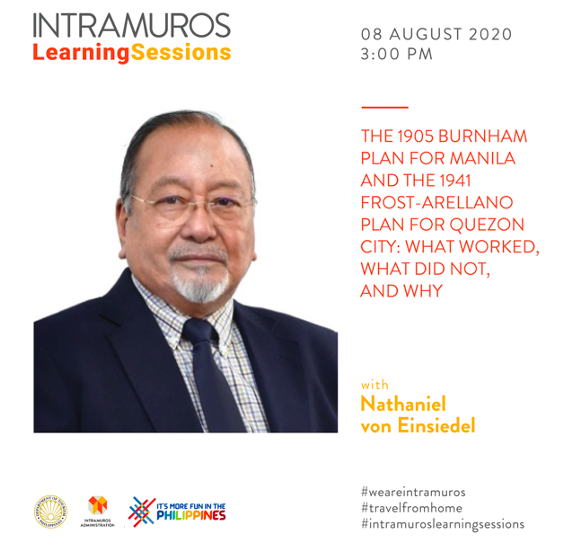Intramuros Learning Sessions episode no. 23

Overview
History has shown that political ambitions have spatial dimensions, often cast in the form of cities as embodiments of a nation-state’s power. The capital city thus occupies an exalted space within the geo-political body of the nation as the best spatial representation of the desired community. Capital cities are invested with symbolic meaning in the form of architecture and city planning. This provided the fundamental objective for both the 1905 Burnham plan for Manila and the 1941 Frost-Arellano plan for Quezon City, although the latter also explicitly aimed at replacing Manila as the Philippines’ capital city. This presentation reviews the major features of both plans and their respective contexts. From this, it attempts to explain why certain elements were implemented while some were not, and the underlying reasons behind this.
- Guest speaker: Nathaniel von Einsiedel, Ph.D.
- Moderator: Rancho Arcilla
About the Speaker: Nathaniel von Einsiedel, Ph.D.
Nathaniel von Einsiedel, Ph.D. is an urban planner, professional Environmental Planner, registered professional architect, and an accredited urban development and management specialist.
He has a B.S. in Architecture from the University of the Philippines, an M.S. in Urban Planning from Columbia University), and a PhD in Public Administration/Urban Management from Pacific Western University.
Dr. von Einsiedel is Chairman and Principal Urban Planner of CONCEP Inc, and currently the President of ASSURE.
He was the founding Commissioner for Planning of the former Metro Manila Commission (now MMDA). He also served as Regional Director for Asia-Pacific of the United Nations Urban Management Program from 1990 to 2004. He was awarded by the Professional Regulations Commission as Outstanding Environmental Planner of the Year in 2012.
About the moderator: Rancho Arcilla
John Paul Escandor Arcilla, known professionally as Rancho Arcilla, is the author of the Intramuros Register of Styles (2021). He served as Chairperson of the Intramuros Technical Committee on Architectural Standards (TCAS) from June 2022 to May 2024. As TCAS Chairperson, Arcilla oversaw the review of all development, including new constructions, in the Walled City.
Arcilla was also the first Archivist of the Intramuros Administration. With a mandate from Atty. Guiller Asido, Administrator of Intramuros from 2017 to 2022, Arcilla established the Administration’s Archives and Central Records Section, serving as its first Section Head from July 2019 to June 2024.
He has an MA in Philippine Studies from UP Diliman and a BA in Asian Studies from the University of Santo Tomas. Arcilla specializes on colonial architecture.
In 2021, Arcilla was instrumental in the development of the Revised 2021 Implementing Rules and Regulations (IRR) of Presidential Decree No. 1616, the main framework and legal instrument in the management of Intramuros District. The architectural provisions of the IRR and the Intramuros Register of Styles (2021) is based on his MA thesis Walls within Walls: The Architecture of Intramuros (2021).
About the Intramuros Learning Sessions
The Intramuros Learning Sessions (ILS) is the educational lecture series of the Intramuros Administration (IA). The IA is an attached national government agency under the Department of Tourism.
Topics are interdisciplinary and cover themes related to Intramuros and Manila studies, Philippine studies, as well as cultural heritage studies. Pursuant to IA’s charter, the ILS aims to contribute to the strengthening of the Filipino’s national identity and sense of belonging and pride.
For inquiries contact us at [email protected]
| See Previous ILS Episode Protecting Agricultural Produce | See Next ILS Episode Leoncio Asuncion’s Iconology and the 19th Century Philippine Colonial Religious Sculpture: An Analysis |
Check out our previous ILS episodes here
For more information contact the Center for Intramuros Studies via [email protected]
Cannot find what you are looking for? Try requesting for more data via our eFOI Portal.







